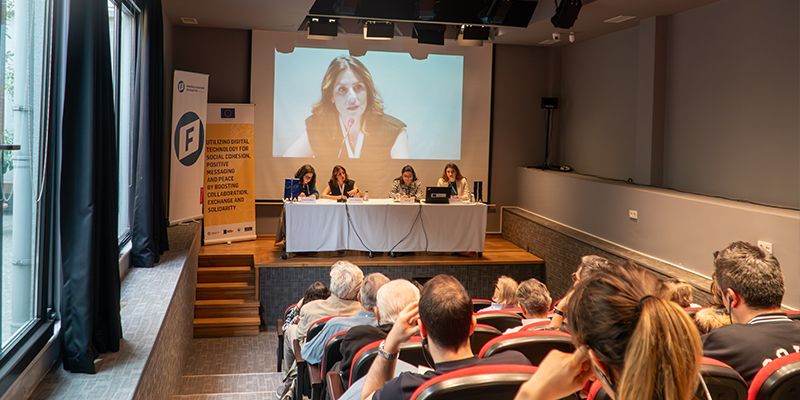As part of the series organized within the scope of the project “Utilizing Digital Technology for Social Cohesion, Positive Messaging and Peace by Boosting Collaboration, Exchange and Solidarity”, the fifth panel titled ‘Combating Disinformation and Hate Speech: The Role of Digital Activism’ took place on Wednesday, April 3, 2024, at the Hrant Dink Foundation’s Havak Hall. The panel was live-streamed in English and Turkish on the Foundation’s YouTube account. The panel was moderated by Gülsin Harman, and the speakers were Sally Hammoud from the American University of Beirut, Elida Zylbeari from the Metamorphosis Foundation, and Özen Baş from Kadir Has University.
Artificial intelligence in communication and media consultant Sally Hammoud began her speech by discussing the evolution of traditional media processes and the integration of artificial intelligence into new media tools today. Continuing by questioning the opportunities and limitations this integration could create, Hammoud mentioned the reservations many users have about artificial intelligence. Mentioning that artificial intelligence is trained through texts, Hammoud also emphasized that users are part of this process with different inputs. Drawing attention to the fact that social media platforms and artificial intelligence tools are largely developed in the Global North, she added that companies prioritize profit, which could pose risks to user experiences. Hammoud also noted that social media platforms have significantly transformed journalism and how people receive news, pushing traditional media tools towards change. Mentioning that users use social media platforms and artificial intelligence tools to make their lives easier, Hammoud pointed out that companies obtain a lot of personal data through this process and evaluate these data through algorithms. Finally, she concluded her speech by noting the critical role of local initiatives and civil society organizations in raising awareness about the safe use of digital platforms among users.
Moderating the panel, Gülsin Harman referred to ongoing discussions about the distinction between obtaining news and journalism in connection with Sally Hammoud's speech. Harman mentioned that many social media accounts are used to disseminate news, creating a dichotomy between professional journalists and social media users.
Özen Baş from Kadir Has University began her speech by discussing the fundamental differences between content production and journalism. Baş noted that the content reflects the feelings and thoughts of the creator, while news serves the purpose of informing society, and content creators and journalists consider different factors. She discussed the participatory role of social media platforms. Adding that one of the possibilities of platforms is to provide space for users to express their opinions through technologies, Baş emphasized the importance of this free space. She mentioned that these free spaces are particularly important for users living under autocratic regimes. Baş then discussed the different methods of digital activism, defining two of them as creating hashtag campaigns and producing counter-speech. She cited the #iamhere counter-speech campaign created by Facebook users in Sweden as a good example in this field.
Following Özen Baş's speech, Gülsin Harman added that the acknowledgement that digital platforms are inherently democratic spaces does not reflect reality, and especially today, social media platforms can offer restrictive experiences to users.
Elida Zylbeari from the Metamorphosis Foundation began her speech by discussing the importance of journalism and the necessity for journalists to prioritize informing society as their primary objective. Highlighting that one of the opportunities of traditional media tools is to empower activists to convey their messages and make their voices heard, Zylbeari stated that the media is a free space for activists to express their ideas. While pointing out that digital activism is one of the most effective methods for reaching broader audiences, and especially in the context of North Macedonia, where traditional media is mostly controlled by the state, social media platforms and digital journalism gain importance. Zylbeari discussed the various methods of digital activism, emphasizing the importance of fact-checking initiatives at the local level and media literacy from an early age. She referred to the Albanian verification platform Truthmeter, where she serves as the editor-in-chief. Finally, she concluded her speech by stating that media workers need to be aware of both digital and real-life threats, highlighting the importance of civil society organizations in this area.

This project is financed by the European Union.


